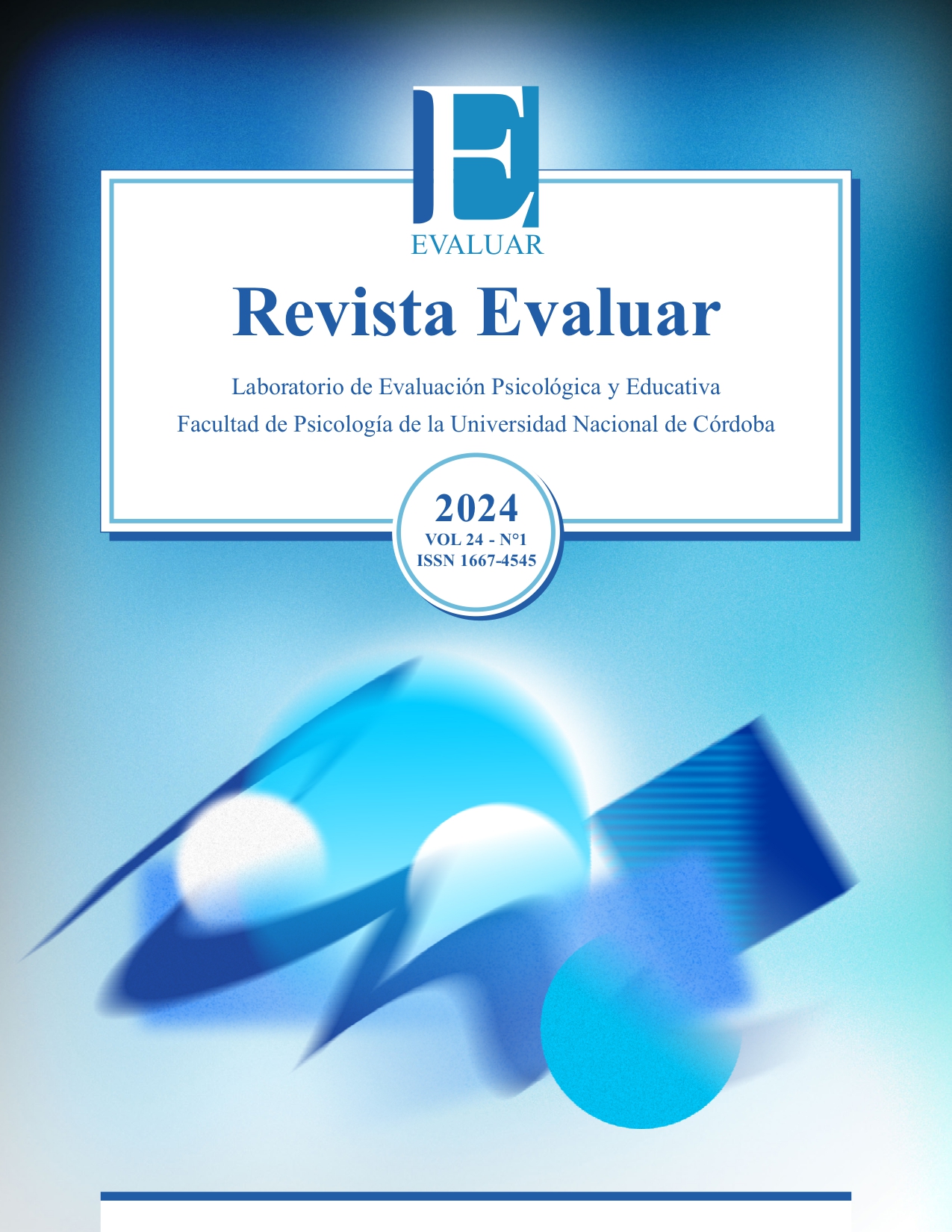Evaluación de la Madurez Psicosocial en Justicia Juvenil: Análisis de la validez de contenido de una herramienta novedosa
DOI:
https://doi.org/10.35670/1667-4545.v24.n1.45121Keywords:
madurez psicosocial, justicia juvenil, juicio de expertos, validez de contenido, evaluación psicológicaAbstract
La madurez psicosocial (MP) es un factor potencial que influye en la toma de decisiones de los adolescentes y su comportamiento social e interpersonal. El estudio actual representa un primer paso para diseñar una nueva prueba de madurez psicosocial adecuada para evaluar este constructo en el contexto forense y en entornos de justicia juvenil. Su objetivo es establecer la validez de contenido para una nueva herramienta de evaluación. Después de una revisión de la literatura, se seleccionaron 38 ítems de diversas medidas y protocolos específicos existentes y se instruyó a 41 expertos para llevar a cabo un análisis de validez de contenido. Los resultados del Índice de Validez de Contenido muestran que el 92% de los ítems analizados fueron clasificados por los expertos como representativos del constructo, y los resultados del Índice de Validez Factorial muestran que los expertos
asociaron el 79% de los ítems al constructo propuesto. En conclusión, la mayoría de los ítems se consideraron representativos
del constructo y de sus componentes individuales, proporcionando una buena base para desarrollar una herramienta de evaluación de la MP. Se plantea la relevancia e implicaciones de los resultados en las tareas judiciales.
Downloads
References
Almanasreh, E., Moles, R., & Chen, T. F. (2019). Evaluation of methods used for estimating content validity. Research in Social and Administrative Pharmacy, 15(2), 214-221. https://doi.org/10.1016/j.sapharm.2018.03.066
Belsky, J., Caspi, A., Moffitt, T. E., & Poulton, R. (2020). The origins of you: How childhood shapes later life. Harvard University Press.
Cauffman, E., & Steinberg, L. (2000). (Im)maturity of judgment in adolescence: Why adolescents may be less culpable than adults. Behavioral Sciences & the Law, 18(6), 741-760. https://doi.org/10.1002/bsl.416
Cauffman, E., Piquero, A. R., Kimonis, E., Steinberg, L., Chassin, L., & Fagan, J. (2007). Legal, individual, and environmental predictors of court disposition in a sample of serious adolescent offenders. Law and Human Behavior, 31(6), 519-535. https://doi.org/10.1007/s10979-006-9076-2
Cavanagh, C. (2022). Healthy adolescent development and the juvenile justice system: Challenges and solutions. Child Development Perspectives, 16(3), 141-147. https://doi.org/10.1111/cdep.12461
Davis, M. H. (1980). Interpersonal Reactivity Index (IRI) [Database record]. APA PsycTests. https://doi.org/10.1037/t01093-000
Expósito, C. D., Marsollier, R. G., Difabio, H. E., & Castro- Santander, A. (2023). Construcción y validación del Cuestionario de Acoso y Ciberacoso Escolar (CACE) mediante juicio de expertos. Revista Evaluar, 23(1), 61-79. https://doi.org/10.35670/1667-4545.v23.n1.41014
Greenberger, E., Josselson, R., Knerr, C., & Knerr, B. (1975). The measurement and structure of psychosocial maturity. Journal of Youth and Adolescence, 4(2), 127-143. https://doi.org/10.1007/BF01537437
Lambie, I., & Randell, I. (2013). The impact of incarceration on juvenile offenders. Clinical Psychology Review, 33(3), 448-459. https://doi.org/10.1016/j.cpr.2013.01.007
Lynn, M. R. (1986). Determination and quantification of content validity. Nursing Research, 35(6), 382-386. https://doi.org/10.1097/00006199-198611000-00017
Moffitt, T. E. (1993). The neuropsychology of conduct disorder. Development and Psychopathology, 5 (1-2), 135-151. https://doi:10.1017/S0954579400004302
Moffitt, T. E. (2003). Life-course persistent and adolescence-limited antisocial behavior. In B. B. Lahey, T. E. Moffitt, & A. Caspi (Eds.), Causes of Conduct Disorder and Juvenile Delinquency (pp. 49-75). The Guilford Press.
Monahan, K. C., Steinberg, L., Cauffman, E., & Mulvey, E. P. (2009). Trajectories of antisocial behavior and psychosocial maturity from adolescence to young adulthood. Developmental Psychology, 45(6), 1654-1668. https://doi.org/10.1037/a0015862
Morales-Vives, F., Camps, E., & Lorenzo-Seva, U. (2013). Development and validation of the Psychological Maturity Assessment Scale (PSYMAS). European Journal of Psychological Assessment, 29(1), 12-18. https://doi.org/10.1027/1015-5759/a000115
Narváez-Burbano, J. H., & Obando-Guerrero, L. M. (2023). Construcción y validación de la Escala de Exposición a Factores de Deprivación Sociocultural (EXFADESO). Revista Evaluar, 23(1), 27-39. https://doi.org/10.35670/1667-4545.v23.n1.41006
Ozkan, T., & Worrall, J. L. (2017). A psychosocial test of the Maturity Gap Thesis. Criminal Justice and Behavior, 44(6), 815-842. https://doi.org/10.1177/0093854817694924
Pailing, A. N., & Reniers, R. L. E. P. (2018). Depressive and socially anxious symptoms, psychosocial maturity, and risk perception: Associations with risk-taking behaviour. PLOS ONE, 13(8), e0202423. https://doi.org/10.1371/journal.pone.0202423
Polit, D. F., Beck, C. T., & Owen, S. V. (2007). Is the CVI an acceptable indicator of content validity? Appraisal and recommendations. Research in Nursing & Health, 30(4), 459-467. https://doi.org/10.1002/nur.20199
Riggs-Romaine, C. L. (2018). Psychosocial maturity and risk-taking in emerging adults: Extending our understanding beyond delinquency. Emerging Adulthood, 7(4), 243-257. https://doi.org/10.1177/2167696818768013
Rocque, M., Beckley, A. L., & Piquero, A. R. (2019). Psychosocial maturation, race, and desistance from crime. Journal of Youth and Adolescence, 48(7), 1403-1417. https://doi.org/10.1007/s10964-019-01029-8
Rubio, D. M., Berg-Weger, M., Tebb, S. S., Lee, E. S., & Rauch, S. (2003). Objectifying content validity: Conducting a content validity study in social work research. Social Work Research, 27(2), 94-104. https://doi.org/10.1093/swr/27.2.94
Steinberg, L., Cauffman, E., & Monahan, K. C. (2015). Psychosocial maturity and desistance from crime in a sample of serious juvenile offenders. Juvenile Justice Bulletin. US Department of Justice, Office of Justice Programs, Office of Juvenile Justice and Delinquency Prevention. https://ojjdp.ojp.gov
Steinberg, L., & Cauffman, E. (1996). Maturity of judgment in adolescence: Psychosocial factors in adolescent decision making. Law and Human Behavior, 20(3), 249-272. https://doi.org/10.1007/BF01499023
Strathman, A., Gleicher, F., Boninger, D. S., & Edwards, C. S. (1994). The consideration of future consequences: Weighing immediate and distant outcomes of behavior. Journal of Personality and Social Psychology, 66(4), 742-752. https://doi.org/10.1037/0022-3514.66.4.742
Wakeling, H., & Barnett, G. (2017). Development and validation of a screening assessment of psychosocial maturity for adult males convicted of crime (Analytical summary). HM Prison & Probation Service. https://www.gov.uk
Weinberger, D. A., & Schwartz, G. E. (1990). Distress and restraint as superordinate dimensions of selfreported adjustment: A typological perspective. Journal of Personality, 58(2), 381-417. https://doi.org/10.1111/j.1467-6494.1990.tb00235.x
Wenger, L., & Andres-Pueyo, A. (2016). Personality and clinical tests in Spanish for assessing juvenile offenders. Papeles del Psicólogo, 37(2), 89-106. https://psycnet.apa.org/record/2016-31958-002
Wenger-Amengual, L. S. (2018). Comportamiento antisocial, personalidad y madurez en adolescentes y jóvenes (Doctoral dissertation). University of Barcelona. http://hdl.handle.net/2445/127229
Yang, Y.-T. C., & Chan, C.-Y. (2008). Comprehensive evaluation criteria for English learning websites using expert validity surveys. Computers & Education, 51(1), 403-422. https://doi.org/10.1016/j.compedu.2007.05.011
Downloads
Published
How to Cite
Issue
Section
License
Copyright (c) 2024 Elena Palacios-van Isschot, Karin Arbach, Antonio Andrés-Pueyo

This work is licensed under a Creative Commons Attribution 4.0 International License.
Revista Evaluar aplica la Licencia Internacional de Atribuciones Comunes Creativas (Creative Commons Attribution License, CCAL). Bajo esta licencia, los autores retienen la propiedad de copyright de los artículos pero permiten que, sin que medie permiso de autor o editor, cualquier persona descargue y distribuya los artículos publicados en Evaluar. La única condición es que siempre y en todos los casos se cite a los autores y a la fuente original de publicación (i.e. Evaluar). El envío de artículos a Evaluar y la lectura de los mismos es totalmente gratuito.




_(3).jpg)



.jpg)



